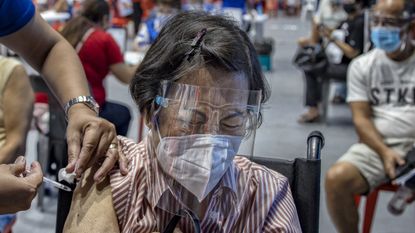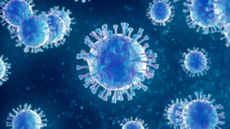The Covid-19 vaccines
Everything you need to know about the world’s coronavirus vaccines

1. Oxford-AstraZeneca
Efficacy
Public Health England (PHE) released research in May that showed two doses of the Oxford-AstraZeneca vaccine were 60% effective against symptomatic disease from the Delta variant (which originated in India) two weeks after the second dose and 93% effective against the Alpha (Kent) strain.
Where is it made?
Subscribe to The Week
Escape your echo chamber. Get the facts behind the news, plus analysis from multiple perspectives.

Sign up for The Week's Free Newsletters
From our morning news briefing to a weekly Good News Newsletter, get the best of The Week delivered directly to your inbox.
From our morning news briefing to a weekly Good News Newsletter, get the best of The Week delivered directly to your inbox.
The vaccine is made in the UK at two sites in Oxford and Keele. A third plant in Wrexham puts the vaccine into vials and packages it up for distribution. AstraZeneca is working with suppliers in 15 other countries to make the vaccine, including sites in the US, Belgium, the Netherlands and India.
Where is it approved?
It has been given approval by the UK’s drug regulator, the European Medicines Agency (EMA) and has been granted emergency approval by the World Health Organization (WHO).
Type of vaccine
Sign up for Today's Best Articles in your inbox
A free daily email with the biggest news stories of the day – and the best features from TheWeek.com
A conventional vaccine, it uses a harmless, weakened version of a common virus that causes colds in chimpanzees. Researchers have previously used this technology to produce vaccines against flu, Zika and Middle East respiratory syndrome (Mers).
Who is using it?
According to The New York Times vaccine tracker, the AstraZeneca jab has been rolled out to 178 countries, the highest number of all the vaccines. However, some governments have banned the jab or limited its use for certain age groups because of concerns about very rare blood clots.
Coronavirus: will the Oxford Covid vaccine be the true game-changer?
2. Pfizer-BioNTech
Efficacy
The Pfizer-BioNTech vaccine is 88% effective against symptomatic disease from the Delta variant and 93% against the Alpha variant two weeks after two doses, according to the PHE data.
Where is it made?
The Pfizer jab is mostly made in Belgium and the US. A manufacturing site has also been set up in the German town of Marburg.
Where is it approved?
The jab has been approved by the UK drug regulator, the EMA and has been granted emergency approval by the WHO.
Type of vaccine
Most vaccines rely on weakened or inactivated parts of the virus to provoke an immune response in their recipients, but the Pfizer version is synthetic.
It is made using messenger ribonucleic acid (also known as messenger RNA or mRNA). Whereas DNA is where we store our genetic information, mRNA - as its name suggests - transmits information to determine how our genes are expressed.
To put that another way, mRNA essentially puts DNA instructions into action. In the case of the Pfizer jab, the researchers synthesised a form of mRNA that will “cause our own cells to make a viral protein” from the Covid-19 coronavirus, says The New York Times.
Who is using it?
The NYT says 106 countries are using the Pfizer vaccination, including the UK, the US, Australia and Europe.
How does the Pfizer coronavirus vaccine work?
3. Moderna
Efficacy
Data published by the UK government shows that the Moderna vaccine is 94% effective against symptomatic disease two weeks after a second dose. The US pharmaceutical company this week announced that a lab-based study also showed promise for the jab against new variants of concern.
Where is it made?
The vast majority of the vaccines are produced in Cambridge, Massachusetts, before being sent to be put into vials in Catalent’s biologics facility in Bloomington, Indiana, and Baxter’s site, also in Bloomington.
In addition, there are agreements in place with several manufacturing sites in Europe.
Where is it approved?
The vaccine has been approved by the UK’s drug regulator, the EMA and the US Food and Drug Administration (FDA).
Type of vaccine
The Moderna vaccine is, like the Pfizer jab, made using messenger ribonucleic acid (mRNA).
Who is using it?
The UK, EU, US, Canada and Switzerland have bought the majority of the available Moderna vaccines, according to data compiled by researchers at Duke University’s Global Health Innovation Centre. It is being used in 56 countries in total.
Coronavirus: Moderna has had effective Covid-19 vaccine since January
4. Janssen-Johnson & Johnson
Efficacy
The company said in January that the latest trials show the vaccine is 85% effective at preventing the most serious coronavirus symptoms after a single dose and 66% effective at preventing moderate to severe illness. However, there is not yet data available on its effectiveness against the Delta variant.
Where is it made?
According to Johnson & Johnson, most of the vaccines are manufactured at a facility in Leiden in the Netherlands.
Where is it approved?
The vaccine is approved for use by the EMA, the FDA and the WHO.
Type of vaccine
Like the Oxford-AstraZeneca vaccine, the Janssen drug uses a modified adenovirus, a harmless, engineered virus that is injected into the patient. The adenovirus DNA triggers an immune response that helps protect the body from Covid-19 infection.
“Unlike other candidates, however, major US trials have focused on its effectiveness as a single dose,” says The Daily Telegraph. Johnson & Johnson is also conducting a second phase-three trial to look into the effects of two doses of the vaccine.
Who is using it?
The US is planning to purchase 100 million additional doses of the vaccine having already shipped out nearly 3.9 million doses of the single-shot vaccine. The EU and the UK also have contracts with Johnson & Johnson.
Janssen’s single-shot Covid-19 vaccine 85% effective
5. Novavax
Efficacy
In stage three trials in the UK, the vaccine was shown to be 96.4% effective against the original Covid strain and 86.3% e effective against new variants, according to the company.
15,000 people participated in the trial, which was conducted during a period of “high transmission” when the “UK variant strain” discovered in Kent was “circulating widely”.
Where is it made?
The Novavax vaccine will be manufactured at Fujifilm Diosynth Biotechnologies in Stockton-on-Tees and the GlaxoSmithKline plant in Barnard Castle.
Where is it approved?
The company is currently seeking approval from international regulatory bodies.
Type of vaccine
The vaccine works differently from other vaccines currently in use in the UK as it “combines an engineered protein” from the Covid virus with a “plant-based ingredient to help generate a stronger immune response”, Sky News reports.
Who is using it?
The vaccine is yet to be rolled out, but the UK has ordered 60 million doses of the vaccine. The majority of the 362 million Covid vaccines ordered by Canada are Novavax doses, while the US and Indonesia are also awaiting deliveries.
6. Sinovac-Coronavac
Efficacy
According to the World Health Organization (WHO), a large phase-three trial in Brazil showed that two doses, administered at an interval of 14 days, had an efficacy of 51% against symptomatic Covid-19, 100% against severe symptoms of the disease, and 100% against hospitalisation, starting 14 days after receiving the second dose.
In a study of real-world effectiveness released by the government of Uruguay this month, the vaccine was found to reduce Covid-19 infections by 61%, hospitalisations by 92% and deaths by 95%.
Where is it made?
The vaccine is largely made at a Sinovac factory in Beijing.
Where is it approved?
The vaccine is approved in China and is on the way to getting approval by the WHO, according to a Sinovac spokesperson earlier this month. It is not approved by the UK’s drug regulator, the EMA or the FDA.
Type of vaccine
Coronavac is a traditional vaccine that uses dead viral particles to expose the immune system to the Covid virus without risking a serious disease response.
Who is using it?
The vaccine has been approved for use in 29 countries, including China, Brazil and Mexico, according to The New York Times’ Our World in Data project at the University of Oxford. It is not approved by the UK’s drug regulator, the EMA in Europe, or the FDA in the US.
Inside the Chinese companies vying to produce the world’s first coronavirus vaccine
7. Sinovac-Sinopharm
Efficacy
Interim results of clinical trials in the UAE said the vaccine was 86% effective in preventing infection in early December, and a peer-reviewed study of the trial released in May found that phase-three trials of the vaccine showed it was 79% effective.
Where is it made?
Also at a Sinovac-owned factory in Beijing. The UAE is also in talks to produce the China-developed jab.
Where is it approved?
Chinese medical authorities have approved the jab, as well as the UAE and Bahrain. It is not approved by the UK’s drug regulator, the EMA or the FDA.
Type of vaccine
It is also a traditional vaccine, like the Coronavac vaccine
Who is using it?
Chinese medical authorities have approved the jab, as well as the UAE and Bahrain. It is not approved by the UK’s drug regulator, the EMA or the FDA. In May, the WHO granted emergency approval for the use of the vaccine, making it the “first vaccine developed by a non-Western country to get WHO backing”, according to the BBC.
China boosting leverage over countries with targeted vaccine diplomacy
8. Sputnik V
Efficacy
Russia's Sputnik V vaccine is around 90% effective against the new Delta variant of coronavirus, according to its developers, reports the Russian news agency Tass.
It is slightly less effective against the Delta strain than the original virus, said Denis Lognunov, the deputy head of the Gamaleya Centre in Moscow.
“We see that there is a slight decrease in serum activity with regard to the delta variant – it is about 2.6 times for Sputnik V,” he said at a press conference.
Against the original strain of the virus – based on the numbers of confirmed Covid cases from 21 days after the first dose of vaccine – it is 91.6% effective, according to a study published in The Lancet in February.
Where is it made?
Most of the doses currently in circulation were produced at the newly opened Moscow-based “R-Pharm”, which has the capacity to produce ten million doses a month. India-based pharmaceuticals giant Virchow Group has also signed a deal “to produce 200 million doses of Sputnik V coronavirus vaccine a year”, according to The Moscow Times.
Where is it approved?
Russian drug authorities have approved the vaccine for use. The EMA began a rolling review of its safety in early March, which had been expected to conclude in May or June.
But the European regulatory body has said that approval of the jab will be delayed because the Gamaleya Centre has missed a deadline to submit clinical data. It means approval for use in the bloc could be postponed until “at least September”, reports Reuters.
The FDA and UK drugs regulator are yet to approve its use.
Type of vaccine
Like the Oxford-AstraZeneca vaccine, Sputnik V is based on a modified version of a common cold virus that “is tailored to carry genetic instructions for making the coronavirus spike protein” and “triggers an immune response to protect” against Covid-19, The Guardian reports.
Who is using it?
According to Statista, Russia has exported the vaccine to Algeria, Argentina, Belarus, Bolivia, Bosnia and Herzegovina, Brazil, China, Egypt, Honduras, Hungary, India, Iran and Italy.
Slovak Prime Minister Igor Matovic stepped down as leader of the country’s ruling coalition over a unilateral deal to purchase the vaccine, while France and Germany have opened negotiations with Vladimir Putin to discuss "cooperation" over vaccines, according to The Telegraph.
Everything we know about Russia’s Sputnik V vaccine
Create an account with the same email registered to your subscription to unlock access.
-
 Italian senate passes law allowing anti-abortion activists into clinics
Italian senate passes law allowing anti-abortion activists into clinicsUnder The Radar Giorgia Meloni scores a political 'victory' but will it make much difference in practice?
By Chas Newkey-Burden, The Week UK Published
-
 Magazine interactive crossword - May 3, 2024
Magazine interactive crossword - May 3, 2024Puzzles and Quizzes Issue - May 3, 2024
By The Week US Published
-
 Magazine solutions - May 3, 2024
Magazine solutions - May 3, 2024Puzzles and Quizzes Issue - May 3, 2024
By The Week US Published
-
 Covid four years on: have we got over the pandemic?
Covid four years on: have we got over the pandemic?Today's Big Question Brits suffering from both lockdown nostalgia and collective trauma that refuses to go away
By Chas Newkey-Burden, The Week UK Published
-
 The hollow classroom
The hollow classroomOpinion Remote school let kids down. It will take much more than extra tutoring for kids to recover.
By Mark Gimein Published
-
 Excess screen time is making children only see what is in front of them
Excess screen time is making children only see what is in front of themUnder the radar The future is looking blurry. And very nearsighted.
By Devika Rao, The Week US Published
-
 Covid-19: what to know about UK's new Juno and Pirola variants
Covid-19: what to know about UK's new Juno and Pirola variantsin depth Rapidly spreading new JN.1 strain is 'yet another reminder that the pandemic is far from over'
By Arion McNicoll, The Week UK Published
-
 Long-term respiratory illness is here to stay
Long-term respiratory illness is here to stayThe Explainer Covid is not the only disease with a long version
By Devika Rao, The Week US Published
-
 Covid inquiry: the most important questions for Boris Johnson
Covid inquiry: the most important questions for Boris JohnsonTalking Point Former PM has faced weeks of heavy criticism from former colleagues at the public hearing
By The Week Staff Published
-
 China's pneumonia cases: should we be worried?
China's pneumonia cases: should we be worried?The Explainer Experts warn against pushing 'pandemic panic button' following outbreak of respiratory illness
By Keumars Afifi-Sabet, The Week UK Published
-
 Vallance diaries: Boris Johnson 'bamboozled' by Covid science
Vallance diaries: Boris Johnson 'bamboozled' by Covid scienceSpeed Read Then PM struggled to get his head around key terms and stats, chief scientific advisor claims
By The Week UK Published